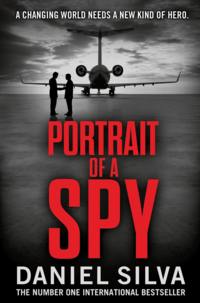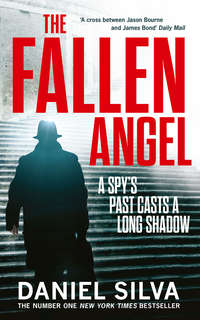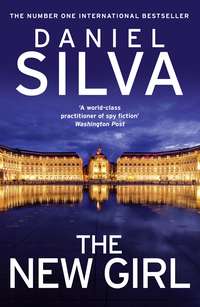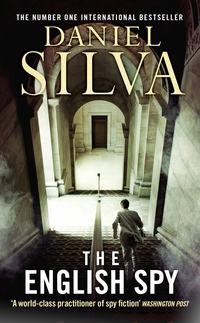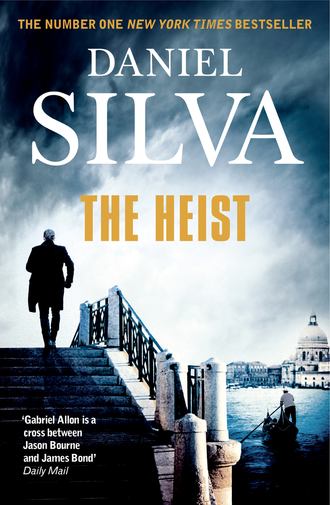
Полная версия
The Heist
Gabriel entered the house and waited for the door to close before turning to face the man who had admitted him. He had soft pale hair and the guiltless face of a country parson. His name was not Davies. It was Nigel Whitcombe.
“Why all the cloak-and-dagger stuff?” asked Gabriel. “I’m not defecting. I just need a word with the boss.”
“The Intelligence Service frowns on the use of real names in safe houses. Davies is my work name.”
“Catchy,” said Gabriel.
“I chose it myself. I was always fond of the Kinks.”
“Who’s Baker?”
“You’re Baker,” replied Whitcombe without a trace of irony in his voice.
Gabriel entered the small sitting room. It was furnished with all the charm of an airport departure lounge.
“You couldn’t find a safe house in Mayfair or Chelsea?”
“All the West End properties were taken. Besides, this one’s closer to Vauxhall Cross.”
Vauxhall Cross was the headquarters of Britain’s Secret Intelligence Service, also known as MI6. There was a time when the service operated from a dingy building in Broadway and its director-general was known only as “C.” Now the spies worked in one of London’s flashiest landmarks, and their boss’s name appeared regularly in the press. Gabriel liked the old ways better. In matters of intelligence, as in art, he was a traditionalist by nature.
“Does the Intelligence Service allow coffee in safe houses these days?” he asked.
“Not real coffee,” replied Whitcombe, smiling. “But there might be a jar of Nescafé in the pantry.”
Gabriel shrugged, as if to say one could certainly do worse than Nescafé, and followed Whitcombe into the galley kitchen. It looked as though it belonged to a man who was recently separated and hoping for a quick reconciliation. There was indeed a container of Nescafé, along with a tin of Twinings that looked as though it had been there when Edward Heath was prime minister. Whitcombe filled the electric kettle with water while Gabriel searched the cabinets for a mug. There were two, one with the logo of the London Olympic Games, the other with the face of the Queen. When Gabriel chose the mug with the Queen, Whitcombe smiled.
“I never realized you were an admirer of Her Majesty.”
“She has good taste in art.”
“She can afford to.”
Whitcombe offered this assessment not as a criticism but merely an observation of fact. He was like that: careful, shrewd, opaque as a concrete wall. He had started his career at MI5, where he had cut his operational teeth working with Gabriel against a Russian oligarch and arms dealer named Ivan Kharkov. Soon after, he became the primary aide-de-camp and runner of off-the-record errands for Graham Seymour, MI5’s deputy director-general. Seymour had recently been named the new chief of MI6, a move that surprised everyone in the intelligence trade except Gabriel. Whitcombe was now serving his master in the same capacity, which explained his presence in the Stockwell safe house. He spooned the Nescafé into the mug and watched the steam rising from the spout of the kettle.
“How’s life at Six?” asked Gabriel.
“When we first arrived, there was a great deal of suspicion among the troops. I suppose they had a right to be uneasy. After all, we were coming across the river from a rival service.”
“It’s not as if Graham was a total outsider. His father was an MI6 legend. He was practically raised within the service.”
“Which is one of the reasons any concerns were short-lived.” Whitcombe drew a mobile device from the breast pocket of his suit and peered at the screen. “He’s pulling up now. Can you manage the coffee on your own?”
“Pour in the water, then stir, right?”
Whitcombe departed. Gabriel prepared the coffee and went into the sitting room. Entering, he saw a tall figure clad in a perfectly fitted charcoal-gray suit and a striped blue necktie. His face was fine boned and even featured; his hair had a rich silvery cast that made him look like a male model one might see in ads for costly but needless trinkets. He was holding a mobile phone to his ear with his left hand. The right he stretched absently toward Gabriel. His handshake was firm, confident, and appropriate in duration. It was an unfair weapon to be deployed against inferior opponents. It said he had attended the better schools, belonged to the better clubs, and was good at gentlemanly games like tennis and golf, all of which happened to be true. Graham Seymour was a relic of Britain’s glorious past, a child of the administrative classes who had been bred, educated, and programmed to lead. A few months earlier, weary after years of trying to protect the British homeland from the forces of Islamic extremism, he had privately told Gabriel of his plans to leave the intelligence trade and retire to his villa in Portugal. Now, unexpectedly, he had been handed the keys to his father’s old service. Gabriel suddenly felt guilty about coming to London. He was about to hand Seymour his first potential crisis at MI6.
Seymour murmured a few words into the mobile phone, severed the connection, and handed it to Nigel Whitcombe. Then he turned toward Gabriel and regarded him curiously for a moment. “Given our long history together,” Seymour said finally, “I’m a bit reluctant to ask what brings you to town. But I suppose I have no choice.”
Gabriel responded by telling Seymour a small portion of the truth—that he had come to London because he was looking into the murder of an expatriate Englishman living in Italy.
“Does the expatriate Englishman have a name?” asked Seymour.
“James Bradshaw,” replied Gabriel. He paused, then added, “But his friends called him Jack.”
Seymour’s face remained a blank mask. “I think I read something about that in the papers,” he said. “He was former Foreign Office, wasn’t he? Did some consulting work in the Middle East. He was murdered at his villa in Como. Apparently, it was quite messy.”
“Quite,” agreed Gabriel.
“What does any of this have to do with me?”
“Jack Bradshaw wasn’t a diplomat, was he, Graham? He was MI6. He was a spy.”
Seymour managed to maintain his composure for a moment longer. Then he narrowed his eyes and asked, “What else have you got?”
“Three stolen paintings, a vault in the Geneva Freeport, and someone named Samir.”
“Is that all?” Seymour shook his head slowly and turned to Whitcombe. “Cancel my appointments for the remainder of the afternoon, Nigel. And find us something to drink. We’re going to be a while.”
9
STOCKWELL, LONDON
WHITCOMBE WENT OUT TO FETCH the makings of a gin and tonic while Gabriel and Graham Seymour settled into the charmless little sitting room. Gabriel wondered what sort of intelligence debris had floated through this place before him. A KGB defector willing to sell his soul for thirty pieces of Western silver? An Iraqi nuclear scientist with a briefcase full of lies? A jihadist double agent claiming to know the time and place of the next al-Qaeda spectacular? He looked at the wall above the electric fire and saw two horsemen in red jackets leading their mounts across a green English meadow. Then he glanced out the window and saw a portly lawn cherub keeping a lonely vigil in the darkening garden. Graham Seymour seemed oblivious to his surroundings. He was contemplating his hands, as if trying to decide where to begin his account. He didn’t bother to delineate the ground rules, for no such disclaimer was necessary. Gabriel and Seymour were as close as two spies from opposing services could be, which meant they distrusted each other only a little.
“Do the Italians know you’re here?” asked Seymour at last.
Gabriel shook his head.
“What about the Office?”
“I didn’t tell them I was coming, but that doesn’t mean they aren’t watching my every move.”
“I appreciate your honesty.”
“I’m always honest with you, Graham.”
“At least when it suits your purposes.”
Gabriel didn’t bother to offer a retort. Instead, he listened intently while Seymour, in the beleaguered voice of a man who would rather be discussing other matters, recounted the brief life and career of James “Jack” Bradshaw. It was familiar territory for a man like Seymour, for he had lived a version of Bradshaw’s life himself. Both were products of moderately happy middle-class homes, both had been shipped off to costly but coldhearted public schools, and both had earned admission to elite universities, though Seymour had been at Cambridge while Bradshaw had landed at Oxford. There, while still an undergraduate, he came to the attention of a professor who was serving on the Faculty of Oriental Studies. The professor was actually a talent spotter for MI6. Graham Seymour knew him, too.
“The talent spotter was your father?” asked Gabriel.
Seymour nodded. “He was in the twilight of his career. He was too worn out to be of much use in the field, and he wanted nothing to do with a job at headquarters. So they packed him off to Oxford and told him to keep an eye out for potential recruits. One of the first students he noticed was Jack Bradshaw. It was hard not to notice Jack,” Seymour added quickly. “He was a meteor. But more important, he was seductive, naturally deceptive, and without scruples or morals.”
“In other words, he had all the makings of a perfect spy.”
“In the finest English tradition,” Seymour added with a wry smile.
And so it was, he continued, that Jack Bradshaw set out along the same path that so many others had taken before him—the path that led from the tranquil quads of Cambridge and Oxford to the cipher-protected doorway of the Secret Intelligence Service. It was 1985 when he arrived. The Cold War was nearing its end, and MI6 was still searching for a reason to justify its existence after being destroyed from within by Kim Philby and the other members of the Cambridge spy ring. Bradshaw spent two years in the MI6 training program and then headed off to Cairo to serve his apprenticeship. He became an expert in Islamic extremism and accurately predicted the rise of an international jihadist terror network led by veterans of the Afghan war. Next he went to Amman, where he established close ties with the chief of the GID, Jordan’s all-powerful intelligence and security service. Before long, Jack Bradshaw was regarded as MI6’s top field officer in the Middle East. He assumed he would be the next division chief, but the job went to a rival who promptly shipped Bradshaw to Beirut, one of the most dangerous and thankless posts in the region.
“And that,” said Seymour, “is when the trouble began.”
“What kind of trouble?”
“The usual kind,” replied Seymour. “He started drinking too much and working too little. He also developed a rather high opinion of himself. He came to believe he was the smartest man in any room he entered and that his superiors in London were utter incompetents. How else to explain that he had been passed over for promotion when he was clearly the most qualified candidate for the job? Then he met a woman named Nicole Devereaux, and the situation went from bad to worse.”
“Who was she?”
“A staff photographer for AFP, the French news service. She knew Beirut better than most of her competitors because she was married to a Lebanese businessman named Ali Rashid.”
“How did Bradshaw meet her?” asked Gabriel.
“A Friday-night mixer at the British embassy: hacks, diplomats, and spies swapping gossip and Beirut horror stories over warm beer and stale savories.”
“And they began an affair?”
“A quite torrid one, actually. By all accounts, Bradshaw was in love with her. Rumors started to swirl, of course, and before long they reached the ears of the KGB rezident at the Soviet embassy. He managed to snap a few photographs of Nicole in Bradshaw’s bedroom. And then he made his move.”
“A recruitment?”
“That’s one way of putting it,” said Seymour. “In reality, it was good old-fashioned blackmail.”
“The KGB’s specialty.”
“Yours, too.”
Gabriel ignored the remark and asked about the nature of the approach.
“The rezident gave Bradshaw a simple choice,” Seymour replied. “He could go to work as a paid agent of the KGB, or the Russians would quietly give the photos of Nicole Devereaux in flagrante delicto to her husband.”
“I take it Ali Rashid wouldn’t have reacted kindly to the news that his wife was having an affair with a British spy.”
“Rashid was a dangerous man.” Seymour paused, then added, “A connected man, too.”
“What kind of connections?”
“Syrian intelligence.”
“So Bradshaw was afraid Rashid would kill her?”
“With good reason. Needless to say, he agreed to cooperate.”
“What did he give them?”
“Names of MI6 personnel, current operations, insight into British policy in the region. In short, our entire playbook in the Middle East.”
“How did you find out about it?”
“We didn’t,” Seymour said. “The Americans discovered that Bradshaw had a bank account in Switzerland with half a million dollars in it. They revealed the information with great fanfare during a rather horrendous meeting at Langley.”
“Why wasn’t Bradshaw arrested?”
“You’re a man of the world,” Seymour said. “You tell me.”
“Because it would have led to a scandal that MI6 couldn’t afford at the time.”
Seymour touched his nose. “They even left the money in the Swiss bank account because they couldn’t figure out a way to seize it without raising a red flag. It was quite possibly the most lucrative golden parachute in the history of MI6.” Seymour shook his head slowly. “Not exactly our finest hour.”
“What happened to Bradshaw after he left MI6?”
“He hung around Beirut for a few months licking his wounds before returning to Europe and starting his own consulting firm. For the record,” Seymour added, “British intelligence never thought much of the Meridian Global Consulting Group.”
“Did you know Bradshaw was dealing in stolen art?”
“We suspected he was involved in business ventures that were not exactly legal, but for the most part we averted our eyes and hoped for the best.”
“And when you learned he’d been murdered in Italy?”
“We clung to the fiction he was a diplomat. The Foreign Office made it clear, however, that they would disown him at the first hint of trouble.” Seymour paused, then asked, “Have I left anything out?”
“What happened to Nicole Devereaux?”
“Apparently, someone told her husband about the affair. She disappeared one night after leaving the AFP bureau. They found her body a few days later out in the Bekaa Valley.”
“Did Rashid kill her himself?”
“No,” replied Seymour. “He had the Syrians do it for him. They had a little fun with her before hanging her from a lamppost and slitting her throat. It was all rather gruesome. But I suppose that was to be expected. After all,” he added gloomily, “they were Syrians.”
“I wonder if it was a coincidence,” said Gabriel.
“What’s that?”
“That someone killed Jack Bradshaw in the exact same way.”
Seymour made no response other than to ponder his wristwatch with the air of a man who was running late for an appointment he would rather not keep. “Helen is expecting me for dinner,” he said with a profound lack of enthusiasm. “I’m afraid she’s on an African kick at the moment. I’m not sure, but it’s possible I may have eaten goat last week.”
“You’re a lucky man, Graham.”
“Helen says the same thing. My doctor isn’t so sure.”
Seymour put down his drink and got to his feet. Gabriel remained motionless.
“I take it you have another question,” Seymour said.
“Two, actually.”
“I’m listening.”
“Is there any chance I can have a look at Bradshaw’s file?”
“Next question.”
“Who’s Samir?”
“Last name?”
“I’m working on that.”
Seymour lifted his gaze to the ceiling. “There’s a Samir who runs a little grocery around the corner from my flat. He’s a devout member of the Muslim Brotherhood who believes Britain should be governed by shari’a law.” He looked at Gabriel and smiled. “Otherwise, he’s a rather nice chap.”

The Israeli embassy was located on the other side of the Thames, in a quiet corner of Kensington just off the High Street. Gabriel slipped into the building through an unmarked door in the rear and made his way downstairs to the lead-lined suite of rooms reserved for the Office. The station chief was not present, only a young field hand called Noah who leapt to his feet when his future director came striding through the door unannounced. Gabriel entered the secure communications pod—in the lexicon of the Office it was referred to as the Holy of Holies—and sent a message to King Saul Boulevard requesting access to any files related to a Lebanese businessman named Ali Rashid. He didn’t bother to state the reason for his request. Impending rank had its privileges.
Twenty minutes elapsed before the file appeared over the secure link—long enough, Gabriel reckoned, for the current chief of the Office to approve its transmission. It was brief, about a thousand words in length, and composed in the terse style demanded of Office analysts. It stated that Ali Rashid was a known asset of Syrian intelligence, that he served as a paymaster for a large Syrian network in Lebanon, and that he died in a car bombing in the Lebanese capital in 2011, the authorship of which was unknown. At the bottom of the file was the six-digit numerical cipher of the originating officer. Gabriel recognized it; the analyst had once been the Office’s top expert on Syria and the Baath Party. These days she was noteworthy for another reason. She was the wife of the soon-to-be-former chief.
Like most Office outposts around the world, London Station contained a small bedroom for times of crisis. Gabriel knew the room well, for he had stayed in it many times. He stretched out on the uncomfortable single bed and tried to sleep, but it was no good; the case would not leave his thoughts. A promising British spy gone bad, a Syrian intelligence asset blown to bits by a car bomb, three stolen paintings covered by high-quality forgeries, a vault in the Geneva Freeport … The possibilities, thought Gabriel, were endless. It was no use trying to force the pieces now. He needed to open another window—a window onto the global trade in stolen paintings—and for that he needed the help of a master art thief.
And so he lay sleepless on the stiff little bed, wrestling with memories and with thoughts of his future, until six the following morning. After showering and changing his clothes, he left the embassy in darkness and rode the Underground to St. Pancras Station. A Eurostar was leaving for Paris at half past seven; he bought a stack of newspapers before boarding and finished reading them as the train eased to a stop at the Gare du Nord. Outside, a line of wet taxis waited under a sky the color of gunmetal. Gabriel slipped past them and spent an hour walking the busy streets around the station until he was certain he was not being followed. Then he set out for the Eighth Arrondissement and a street called the rue de Miromesnil.
10
RUE DE MIROMESNIL, PARIS
IN THE INTELLIGENCE BUSINESS, as in life, it is sometimes necessary to deal with individuals whose hands are far from clean. The best way to catch a terrorist is to employ another terrorist as a source. The same was true, Gabriel reckoned, when one was trying to catch a thief. Which explained why, at 9:55, he was seated at a window table of a rather good brasserie on the rue de Miromesnil, a copy of Le Monde spread before him, a steaming café crème at his elbow. At 9:58 he spotted an overcoated, hatted figure walking briskly along the pavement from the direction of the Élysée Palace. The figure entered a small shop called Antiquités Scientifiques at the stroke of ten, switched on the lights, and changed the sign in the window from FERMÉ to OUVERT. Maurice Durand, thought Gabriel, smiling, was nothing if not reliable. He finished his coffee and crossed the empty street to the entrance of the shop. The intercom, when pressed, howled like an inconsolable child. Twenty seconds passed with no invitation to enter. Then the deadbolt snapped open with an inhospitable thud and Gabriel slipped inside.
The small showroom, like Durand himself, was a model of order and precision. Antique microscopes and barometers stood in neat rows along the shelves, their brass fittings shining like the buttons of a soldier’s dress tunic; cameras and telescopes peered blindly into the past. In the center of the room was a nineteenth-century Italian terrestrial floor globe, price available upon request. Durand’s tiny right hand rested atop Asia Minor. He wore a dark suit, a candy-wrapper gold necktie, and the most insincere smile Gabriel had ever seen. His bald pate shone in the overhead lighting. His small eyes stared straight ahead with the alertness of a terrier.
“How’s business?” asked Gabriel cordially.
Durand moved to the photographic devices and picked up an early-twentieth-century camera with a brass lens by Poulenc of Paris. “I’m shipping this to a collector in Australia,” he said. “Six hundred euros. Not as much as I would have hoped, but he drove a hard bargain.”
“Not that business, Maurice.”
Durand made no reply.
“That was a lovely piece of work you and your men pulled off in Munich last month,” Gabriel said. “An El Greco portrait disappears from the Alte Pinakothek, and no one’s seen or heard of it since. No ransom demands. No hints from the German police that they’re close to cracking the case. Nothing but silence and a blank spot on a museum wall where a masterpiece used to hang.”
“You don’t ask me about my business,” said Durand, “and I don’t ask you about yours. Those are the rules of our relationship.”
“Where’s the El Greco, Maurice?”
“It’s in Buenos Aires, in the hands of one of my best customers. He has a weakness,” Durand added, “an insatiable appetite that only I can satisfy.”
“What’s that?”
“He likes to own the unownable.” Durand returned the camera to the display shelf. “I assume this isn’t a social call.”
Gabriel shook his head.
“What do you want this time?”
“Information.”
“About what?”
“A dead Englishman named Jack Bradshaw.”
Durand’s face remained expressionless.
“I assume you knew him?” asked Gabriel.
“Only by reputation.”
“Any idea who cut him to pieces?”
“No,” said Durand, shaking his head slowly. “But I might be able to point you in the right direction.”
Gabriel walked over to the window and turned the sign from OUVERT to FERMÉ. Durand exhaled heavily and pulled on his overcoat.

They were as unlikely a pairing as one might have found in Paris that chill spring morning, the art thief and the intelligence operative, walking side by side through the streets of the Eighth Arrondissement. Maurice Durand, meticulous in all things, began with a brief primer on the trade in stolen art. Each year thousands of paintings and other objets d’art went missing from museums, galleries, public institutions, and private homes. Estimates of their value ranged as high as $6 billion, making art crime the fourth most lucrative illicit activity in the world, behind only drug trafficking, money laundering, and arms dealing. And Maurice Durand was responsible for much of it. Working with a stable of Marseilles-based professional thieves, he had carried off some of history’s greatest art heists. He no longer thought of himself as a mere art thief. He was a global businessman, a broker of sorts, who specialized in the quiet acquisition of paintings that were not actually for sale.



